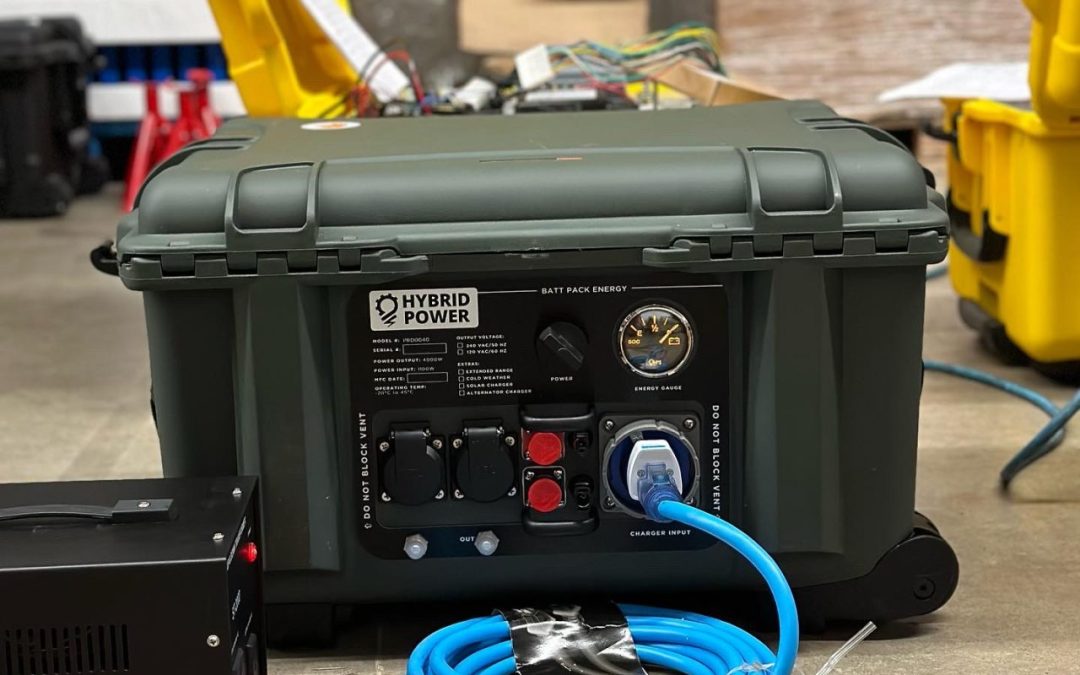by Treena Hein
At this moment, made-in-Canada rechargeable ‘Batt Packs’ are being used by soldiers in Ukraine — and the company that makes them is hoping these innovative units will become a standard piece of field equipment for humanitarian efforts and armed forces in many countries, including Canada.
The lightweight, silent and fume-free ‘Batt Pack,’ made by Hybrid Power Solutions (HPS) of southern Ontario, fills a need for a substantial amount of portable power generation. At 40 kg with no heat signature and functional down to -30°C, they can be charged in three different ways to power countless applications.
“We’ve been told they went to the front lines in Ukraine, so they might be powering light and heat in camps and trenches, but also to recharge drones or rescue people trapped in buildings after an artillery strike,” said Francois Byrne, founder and chief operating officer. “They can easily power a heavy-duty tool to get into or out of a building, like a jackhammer, coring drill or concrete saw. And because they provide high-quality electricity with a pure sign wave, they can power items like laptops [and] sensitive communications equipment.”
To make sure the batteries could be put to immediate use in Ukraine, Byrne and his team did two things before shipping 22 units overseas just after New Year’s Day. They made the connections simple and fast, and made the instructions graphics-based to avoid language barriers.
Batt Packs are rugged, weatherproof, and with an automated heating unit that activates in extreme cold. Yes, that draws power, says Byrne, but it prevents the loss of 20 to 30 percent in Batt Pack performance when temperatures dip down.
The 4000W-3.6kWh Batt Packs now in Ukraine can be charged with their portable solar arrays (six to eight hours) or from the grid (about five hours). But the Canadian Armed Forces (CAF) also requested vehicle charging.
“We quickly customized it so that you can put one on a vehicle roof and simply run jumper cables to it from the vehicle battery,” Byrne said. “Charge time using that method is five to six hours.” In addition, combining up to three charge sources — for example, attaching the solar array during vehicle charging — cuts charge time significantly.
A new 5000W-5kWh version has a much faster charge time due to its larger solar array and higher energy capacity battery. These units are also 20 percent smaller and lighter due to eliminating wasted interior space and new battery technology.
Byrne started HPS in 2015 and he now has 24 employees. Before this Ukraine contract, the firm did have some military involvement, supplying the battery system for Rheinmetall Canada’s Mission Master uncrewed ground vehicle project. He’s also had discussions with a combat vehicle manufacturer, but the construction and mining sectors have been the company’s main focus.
Byrne has always viewed the military as a potential customer — he knew he had a product armed forces needed — but was intimidated and unsure how to break in. He looked at how to pitch a solution through the Innovation for Defence Excellence and Security (IDEaS) program, for “reliable, energy efficient, integrated and scalable energy systems” for temporary camps. But it took until January 2020 to get a presentation slot under the Tactical Power Systems program.
“It’s a procurement project for replacement of all generators with new technology,” Byrne explained. “I gave it our best shot, but as the months went on, we lost some hope. Then in December 2022, we got a call about getting our Batt Packs to the Ukrainian Armed Forces as soon as possible.”
The urgency to ship, combined with the units needing to be modified for European voltage, meant HPS team members worked every day, through Christmas and New Years, scrambling to source and integrate European parts. By the first week of January, 22 units shipped out, and they were even camo green.
“That’s all we could ship due to the parts we could get, but we’re going to be shipping more 5000W units as fast as we can,” he said. “We’re hoping to ship hundreds this year.”
“This is a proud moment for us,” he added. “It’s great to help with off-grid dream homes and mining and construction, but this order means we are helping in Ukraine. Of course, we don’t know where exactly our units are and what they are being used for, but we hope they are having a big impact.”




